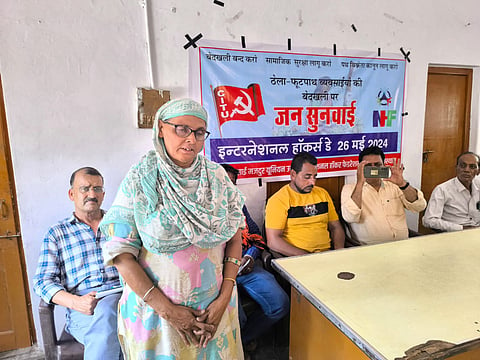
Udaipur- Despite the provisions of the Street Vendors (Protection of Livelihood and Regulation of Street Vendors) Act, 2014, which offer legal protection to millions of street vendors across India, handcart traders in Udaipur continue to face relentless harassment from local authorities.
This was the central theme at a public hearing held at Shirali Bhawan on International Hawkers Day 26 May, organized by the Handcart Workers Union and the National Hawker Federation.
The event highlighted the plight of street vendors, with numerous accounts of forced evictions and mistreatment by municipal officials.
Yakub Mohammad, representing the National Hawker Federation, emphasized the pivotal significance of the Street Vendors (Protection of Livelihood and Regulation of Street Vendors) Act 2014.
This legislation, he stressed, extends crucial legal safeguards to millions of street vendors across India, encompassing those who operate through cabins, carts, and street stalls.
Among its key provisions are the clear definition of a street vendor, periodic surveys every five years, mandatory registration processes, and stringent prohibitions against arbitrary evictions, whether due to encroachment or urban beautification efforts.
Central to the Act is the establishment of Town Vending Committees, constituted by electing representatives from within the street vendor community, ensuring their voices are heard in decision-making processes. Additionally, the Act allocates a notable 2.5% of urban land specifically for street vending activities, acknowledging their integral role in urban economies.
However, Mohammad lamented the systemic challenges hindering the effective implementation of this critical legislation. Despite its noble intent, the Act often encounters resistance and apathy from those in positions of power and authority. Its enforcement remains sporadic, with efficacy largely contingent upon the prevalence of land disputes rather than a steadfast commitment to protect street vendors' rights.
However, as testified by several attendees, these legal protections are often ignored in practice.
Tabassum, a vendor with a 40-year history of selling near Hathipol Mosque, recounted how municipal authorities have continually disrupted her business despite her long-standing presence. Her son Irfan narrated an incident where their cart was confiscated early in the morning, and he was physically assaulted when trying to retrieve it.
Other vendors shared similar stories of abuse and corruption.
Najma, who sells vegetables at Savina market, described daily harassment from the police, who accuse her of causing traffic disruptions.
Yogesh Kumar, who peddles goods on Hospital Road, spoke of persistent harassment despite enduring harsh weather conditions to make a living.
Kamaljeet, a vendor at Delhi Gate for 13 years, highlighted the financial strain caused by arbitrary fines and the confiscation of his cart. Kamaljeet, described the challenges he faces.
He rents his cart, but municipal officials and the police frequently confiscate his weighing scales, goods, and cart. Although the scales cost 1100 rupees, they issue a receipt for 2000 rupees. " If anyone protests, the police resort to verbal abuse and beatings. It is impossible for a street vendor to earn 3100 rupees a day to cover such exorbitant receipts", Kamaljeet almost choked.
Altaf from Hathipol shared his struggles, explaining that whenever he takes out his cart, the municipal corporation and police prevent him from working. He has a young child at home who needs 100 rupees worth of milk daily due to illness. If he is unable to set up his cart, he worries about how he will be able to buy milk to feed his child.
In a rare success story, Shahid Mohammad from Doodh Talai shared how collective resistance and a stay order from the court temporarily protected his stall from eviction.
However, this success is not widespread, and the constant threat of eviction looms large for most vendors.
The public hearing also featured insights from CITU State Committee member Hiralal Salvi, who criticized the municipal authorities and the Udaipur Development Authority for prioritizing land sales over the welfare of street vendors. He accused them of disregarding municipal licenses and using encroachment drives as a pretext for evictions.
Former councilor and CITU district convenor Rajesh Singhvi emphasized the lack of cooperation from local authorities, who were invited but did not attend the hearing.
Singhvi underscored the ongoing struggle against the BJP board, which he described as detrimental to the poor and working-class vendors.
Addressing the participants he said, " the character of those in power often determines their treatment of the public. Despite having legal rights, street vendors in Udaipur face continuous harassment and eviction threats, forcing them to repeatedly seek stay orders from the courts. Municipal authorities often ignore these court orders, while the police, administration, municipal corporation, and Udaipur Development Authority appear to favor the wealthy. "
"Meanwhile, the Aravalli hills are being cut down to build colonies and hotels, and commercial establishments occupy public roads without proper parking provisions. The municipal corporation needs to recognize that removing street vendors will not solve the city's traffic problems. In response, street vendors are organizing to fight back against these injustices and demand their rights." He called for unity among handcart traders to fight for their rights and legal protections.
The public hearing concluded with a demand for the implementation of social security measures and the proper enforcement of the Street Vendors Act.
The participants pledged to draft a formal letter outlining their grievances and demands to be presented to the District Collector and the Superintendent of Police.
The event ended with chants of "Stop Eviction, Implement Social Security, Implement Street Vendors Act," highlighting the collective resolve of Udaipur's street vendors to continue their fight for justice and recognition.
You can also join our WhatsApp group to get premium and selected news of The Mooknayak on WhatsApp. Click here to join the WhatsApp group.